|

by James Corbett
June 09, 2024
from
TheCorbettReport Website
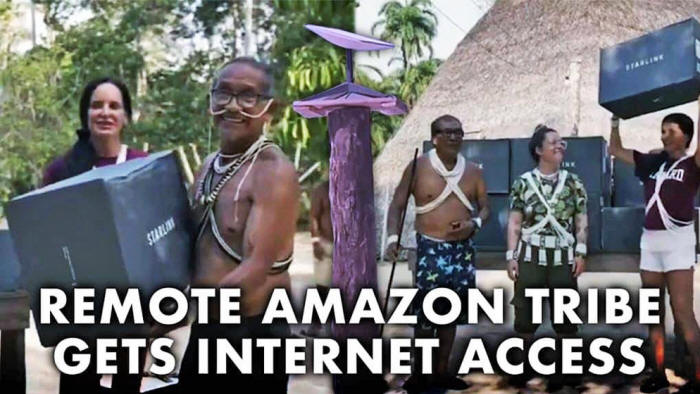
Have you ever wondered what would happen if you suddenly gave the
Internet to a remote, isolated indigenous tribe with no prior
experience of the modern world?
Well, wonder no more!
That's exactly what you're about to find
out...
Yes, as either an elaborate PR stunt or a
selfless act of generosity (depending on whom you ask), a wealthy
American benefactor has just bestowed the "gift" of
Starlink
antennae on an Amazonian tribe to connect their isolated community
to the Internet.
In other words,
we are watching exactly what transpires when
you introduce a non-technological tribe to the "glories" of the
Internet.
And the result of this strange little experiment
has been exactly as horrific as you might imagine...
THE STORY
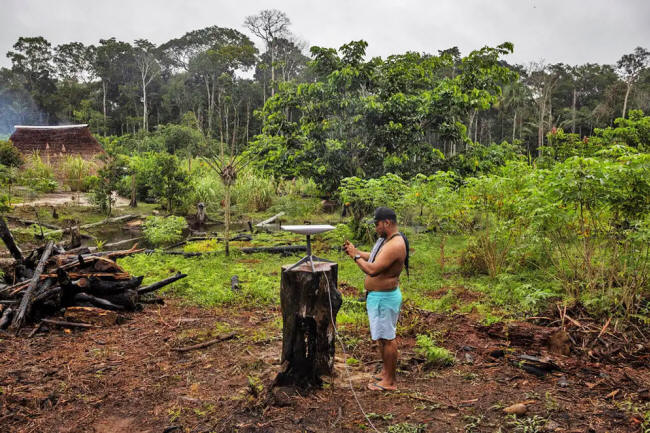
The Vale do Javari is one of the largest indigenous territories in
Brazil.
Located in a remote region of Brazil's Amazonas
state, it is
believed to be home to,
"the greatest concentration of isolated
groups in the Amazon and the world."
One of those groups is the
Marubo, a tribe of around 2,000
people who have had only limited contact with the outside world
since they were first "discovered" during the Amazon rubber boom of
the early 20th century.
The Marubo have been in touch with the outside world for a century
now, but for the most part they have eschewed modern technology and
amenities in favor of their traditional tribal lifestyle.
They live in communal huts and they fish, hunt
wild boar, grow cassava and eat banana porridge.
But nine months ago, everything changed for the Marubo...
That's when Enoque Marubo - a leader of
the tribe who spent years living in the "civilized" world and thus
realized the potential value of the Internet - recorded a 50-second
video asking for help connecting his community to the world wide
web.
Days later, they heard back from Allyson
Reneau...
Reneau is - according to
her website - an
international motivational speaker, a professional gymnastics coach,
a successful entrepreneur and, oh by the way, the mother of 11
children.
She also likes to highlight her international
charity work, which includes visiting children in Rwanda, talking on
Pakistani television and speaking at conferences in South Africa.
Also,
according to The New
York Times, Reneau likes to highlight international charity
work she may or may not have been involved with.
In 2021, she was interviewed on CNN and Fox
News for "rescuing" an all-girls robotics team from Afghanistan
during the Taliban takeover.
But days later, lawyers for the robotics team
told Ms. Reneau to stop taking credit for a rescue she had
little to do with.
And so, when she received a video from a
Brazilian indigenous tribal leader in traditional headdress begging
for 20 Starlink antennae to bring the Internet to his remote corner
of the Amazon, Reneau jumped at the opportunity.
Comparing herself to Charlie Wilson - yes,
that
Charlie Wilson - she bought the antennas with her own money and
booked a flight to Brazil to deliver them to the Marubo herself.
With a cameraman along to document the
magnanimous act of philanthropy, Reneau, Enoque Marubo and a
band of men carrying satellite antennae on their backs trudged miles
through the forest to reach the Marubo's isolated encampment deep in
the heart of the Javari Valley Indigenous Territory.
The antennae worked. Connected to Starlink via
some cheap phones bought with Brazilian government welfare checks,
the Marubo were now online.
So, what did this new connection with the outside
world mean for the Marubo? If a picture is worth a thousand words,
then here are two thousand words of explanation for you.
First, the "before" picture of Marubo village
life:
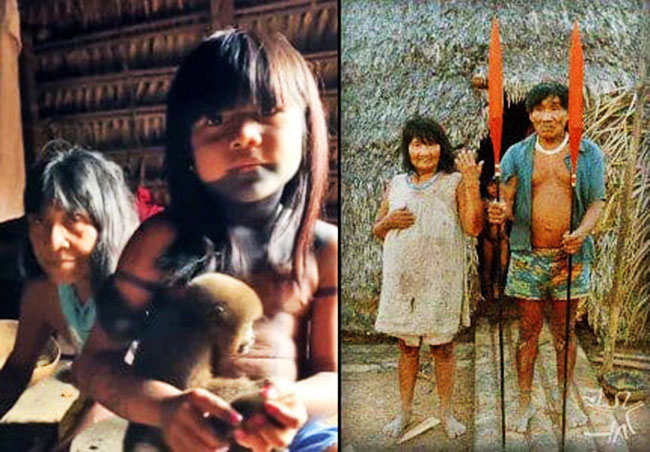
And then the "after" picture:
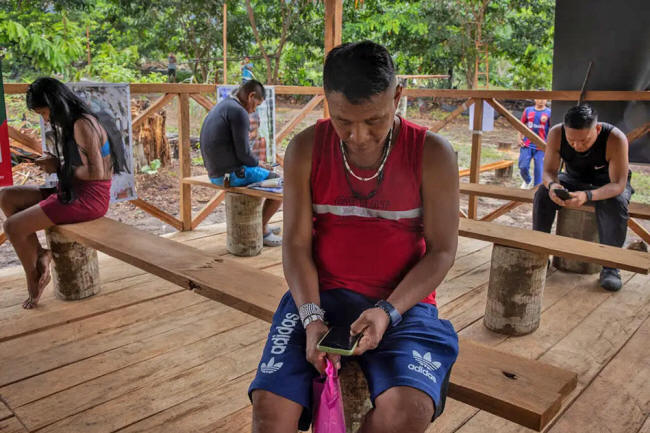
The connection was, as Enoque had
envisioned, immediately useful.
It enabled village leaders to communicate with
each other and coordinate their emergency response, it helped
teachers share lessons with students in far away villages and it
allowed the Marubo to communicate with friends and family who had
moved out of the forest to join the modern world.
But the connection was also, as Enoque
now concedes, immediately damaging to the community...:
"It changed the routine so much that it was
detrimental.
In the village, if you don't hunt, fish and
plant, you don't eat."
Instead, teenagers were spending their time on
social media networks, watching soccer videos and chatting on
Instagram.
Young men, meanwhile, immediately gravitated
toward pornography, a fact Enoque finds particularly disturbing:
He is most unsettled by the pornography.
He said young men were sharing explicit
videos in group chats, a stunning development for a culture that
frowns on kissing in public.
"We're worried young people are going to
want to try it," he said of the graphic sex depicted in the
videos.
He said some leaders had told him they had
already observed more aggressive sexual behavior from young men.
As a result, Internet use has been limited.
The antennae are switched on only two hours in
the morning, five hours in the evening, and all day on Sundays.
The story is interesting because it seems to
exactly confirm what we already know:
the Internet can ruin a society in a matter
of months...
The story also contains the type of head
scratching statements that make sense only to those who understand
the insanity that the Internet medium engenders in its users.
"Everyone is so connected that sometimes they
don't even talk to their own family," laments Alfredo Marubo,
leader of one association of Marubo villages.
"Young people have gotten lazy because of the
Internet," complains Tsainama Marubo, a 73-year-old
tribal elder.
Instead of learning the orally transmitted
traditions of Marubo culture - kneading jenipapo berries to
make black body paint, for example, or making ropes of jewelry from
snail shells - now the youth are only interested in,
"learning the ways of the white people."
Or, in the understated words of the always staid
and subdued
headline writers of The New
York Post:
"Remote Amazon tribe finally connects to
Internet - Only to wind up hooked on porn, social media".
So, what does this story tell us about the
Internet and the global society it is creating?
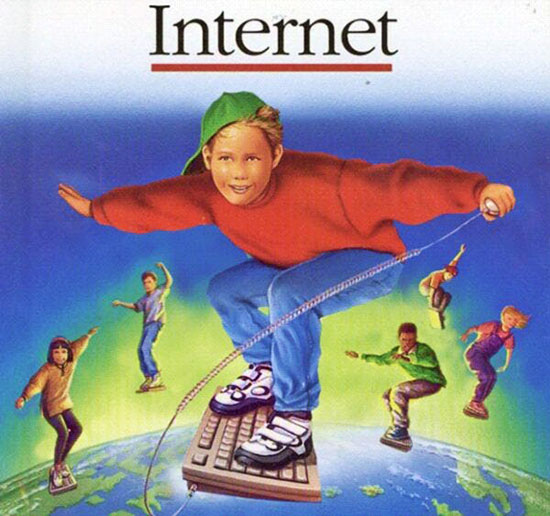
Why is our immediate reaction to the story of the
Marubo:
"Yeah, that sounds about right"?
And, perhaps more importantly,
why is our next impulse to
immediately scroll on to the next article in our never-ending
news feed, congratulating ourselves that we correctly predicted
this sorry result?
Is it because we know that the Internet was,
from its very inception, a
creation
of the military-industrial complex and the alphabet soup
agencies that was always intended as a tool for tracking,
surveilling and controlling any would-be opposition to the
Silicon Valley overlords?
Is it because we know
by
their own admission that the pioneers of social media
deliberately engineered their algorithms to exploit
vulnerabilities in human psychology and make their platforms as
addictive as humanly possible?
Or that (again
by
their own admission) these same social media mavens concede
that social media is "ripping apart society"?
Or that, by and large, all the Big Tech CEOs
raise their children
tech-free or greatly
restrict their children's screen time?
Is it because we know, as one of the earliest
viral Internet videos (before YouTube was even a thing) has it,
"The Internet is For Porn," and that pornography is a
neurological weapon rewiring the brains of an entire
generation of men in ways
neurologically indistinguishable from severe drug addiction?
Or that porn has actually been used as a
weapon of demoralization, as when the Israelis
seized three Palestinian television stations and began
"broadcasting pornographic movies and programs in Hebrew" on
them?
(And is it any wonder that Elon Musk
has just
tweaked Twitter's rules to formally allow adult content on
the platform?)
Is it because, as Jack Dorsey has
admitted, the social media companies that now dominate the world
wide web not only made the disastrous decision to
centralize discovery and identity into corporations, but
that these companies and their mysterious algorithms are now
threatening free will itself?
Is it because, as a diligent student of
The Corbett Report, you know about Google's
Selfish Ledger and
Facebook's mood-manipulation experiment and
Facebook's shadow profiles?
Or because you have learned that
Information Overload is a Weapon of Control and that
humans have no free will if Big Tech gets their way?
Or because you have discovered the
life-altering power of
The Filter
Bubble?
Or because you are now aware of the long-term
goal of the
hucksters and
charlatans of our era to lead us (by way of "mixed
reality") towards accepting the coming
integration of man and machine?
Is it because you not only studied
The Media Matrix
documentary and my online course on
Mass Media: A History, but also followed those cookie crumb
trails back to Marshall McLuhan's groundbreaking work on Understanding
Media and his 1965 interview on
The
Future of Man in the Electric Age?
Or, for those who find the philosophical
musings of an articulate and erudite Albertan too much to
handle, is it because you at least followed the cookie crumb
trail back to Neil
Amusing Ourselves to Death Postman and his work on
Technopoly and his lecture on
The
Surrender of Culture to Technology?
Is it because, having contemplated all of
this information and having combined it with
the startling fact that the average American now spends 11
hours per day listening to, watching, reading or generally
interacting with media, you realize that, in some fundamental
sense, humans are already some amalgamation of human and
electronic media, some species of homo medias that no
longer remembers what it is to live an authentic human
experience in the natural world?
Yes, I dare say it is because of all that.
So, here's the real question:
why are you still sitting there on your
device, reading these words...?

This is where I could end the article with some
upbeat take away about our predicament.
The part where - after acknowledging the gravity
of the situation - I remind us all that we are still in control and
that it is ultimately our choice how we spend our time, our
attention, our energy and our resources.
I could exhort us to take this responsibility
seriously and encourage us all to wisely choose what we spend our
time doing.
I could then remind you of my #SolutionsWatch
episodes on
Deleting
Your Social Media and
Unplugging from the Matrix and
Taking
Back Our Tech and
Eye-bouncing and my conversation with Larry Rosen on
How to Control Your Smartphone (So It Doesn't Control You).
I could even end this article by pointing out (as
Neil Postman does in the lecture linked above) that,
the fact
that everyone is now aware of the problem of the Internet is itself
a hopeful sign...!
After all, it means that we are no longer under
the delusion of the
old
propaganda designed to convince us that the "Information
Superhighway" is going to be the answer to (rather than the
cause of) all our problems.
I mean, that's precisely the point of all these
articles on the "Remote Amazon Tribe gets the Internet and
Immediately Falls Apart" story, isn't it?
These types of articles are playing on the fact
that we all know the Internet is increasingly a vile and
divisive place that is tearing society apart at the seams. That's
why we clicked on it. That's why we're reading about it.
But once again,
I am left wondering why we are all
still here.
I know everyone has their excuses for participating in
this societal train wreck.
Me...? I now make my living online! I have to be
here!
What choice do I have? Of course, there is
the option to completely eschew the Internet altogether and to go
live a happy, care-free 100% authentically human life.
Tell you what:
I'll sweeten the pot.
I hereby pledge that I will pay anyone who,
after reading this article, forswears the Internet and never
touches another electronic device again a cool ONE MILLION
JAPANESE YEN (6,400 $ about)...!
The trick is you'll have to find a way of getting
in contact with me and proving your Internet-free existence and
collecting the money in person. Good luck!
But for the rest of us... here we are.
Like it or not, there is no turning the clock
back on the Gutenberg Revolution 2.0...
So, perhaps it's appropriate to give the last
word today to the Marubo.
Decades ago, the most respected Marubo shaman
had visions of a hand-held device that could connect with the
entire world.
"It would be for the good of the people,"
he said.
"But in the end, it wouldn't be."
"In the end," he added, "there would be
war."
His son sat on the log across from him,
listening.
"I think the Internet will bring us much
more benefit than harm," Enoque said, "at least for now."
Regardless, he added, going back was no
longer an option.
"The leaders have been clear," he said.
"We can't live without the Internet"...
|







